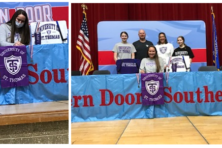Hailey DuBois’ Plan to Change the World
- Share
- Tweet
- Pin
- Share

We receive a lot of emails at the Peninsula Pulse, but rarely from one so young, spirited and passionate.
“What I am emailing you about today is what I would like to do to educate the community about a problem we face in the world,” wrote Hailey DuBois, a 16-year-old junior at Sturgeon Bay High School, in her email last month. “I believe being able to eat healthy and organically shouldn’t be a luxury. I want to help make it affordable for the everyday person and I can help achieve that goal if I’m able to go to college to solve that problem. I hope to even get companies to be able to grow organically to get rid of these harmful preservatives in our everyday food. My ultimate goal is to unite as one and bind together to solve climate change, sustainability, and eating organically affordable. However, that is in the far future. As a starting point, I’m basing my project off what we have to offer in Door County.”
The Sturgeon Bay resident is no less enthusiastic by phone.
“I’m researching how people can support sustainability, how they can grow produce, and where they can get the resources near them to do it affordably,” she said. “I’ve already found so much and learned so much. I still have more to learn in my research, and I can’t wait!”
DuBois was tapped earlier this fall by the Small Town and Rural Students (STARS) College Network. Sixteen of the nation’s most prominent universities and colleges – Yale, Northwestern, Brown, Caltech, the University of Chicago, to name just a few – teamed up for the effort earlier this year to help students from small-town and rural America enroll in, succeed at, and graduate from the undergraduate program of their choice.
One of the STARS programs is RISE, an anchor program of a $1 billion commitment from Eric and Wendy Schmidt to find and support global talent in an effort to solve humanity’s most pressing problems. The program reaches teens between the ages of 15-17 and once selected, encourages a lifetime of service and learning by providing support – scholarships, mentorship, networking and access to career development opportunities.
DuBois doesn’t know how they found her – she suspects it was her GPA which, last she checked, was better than perfect at 4.012 – but she’s glad they did.
“They give you a project to do in your community that benefits the community as a whole, but it’s based on your passions,” she said. “You use your passions to solve a problem in the community.”
Her passions are the culinary arts – baking and cooking – paired with the environment. She’s wanted to be a scientist since she was a little kid, and her career aspirations now include environmental science or culinary science. The latter is a multidisciplinary field that uncovers ways to create new food and improve the safety, preservation, development and storage of existing foods.
“I would want to try and get the food clean and organic, and get it cheaper and easier for companies to be certified organic,” she said.
Her project is to conduct a series of public meetings to talk about sustainability and why it’s important, leaning upon all she’s been learning in her research. The conversations take place Dec. 8, 10, 16 and 17 at different locations around the peninsula (see sidebar for specific places/times).
She said she’s not looking to change any minds or to force opinions on people.
“Nowadays, people hear about climate change and they don’t want to hear about it anymore,” she said. “I want people to want what I want for themselves. I want to present what I’ve learned and found without them thinking they need to do it.”
Putting herself out there means subjecting herself to some tough questions. She’s only been researching for two months – why does she believe she’s in a position to educate the community?
“That’s one of my highlight points,” she said. “Yes, I’m young and I don’t fully understand how the world works. But I’m living proof that there’s still time; my generation is the proof of the future if we want to make that change. If we want sustainability and better food and a cleaner earth, then we need to show the older generations that it’s possible. It’s hard work; anything worthwhile is.”
DuBois will submit all her project work to RISE in January, competing with other students across the country to become the winning project of the year – a distinction that comes with additional opportunities and benefits. She wants to win, she said, but the score must be personal, too.
“I thought if I’m going to do this, I want it to be something I’m proud of,” she said.


